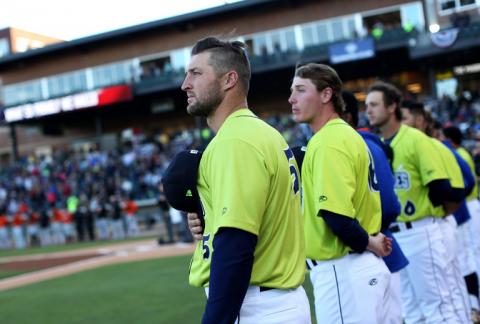Tebow’s Test of Faith
New York Times
April 14, 2017
by Doug Glanville
There are many aspects of baseball that set it apart from other sports. I often cite these differences as related to its pace, perspective, nuance and calculus. Yet baseball is also a game of faith, an understanding my playing days only reinforced. Inside its daily ecosystem, your beliefs are tested like in no other game. In part because it comes at you every day.
Tim Tebow, the former professional football player, began his hopeful journey to baseball’s major leagues with a bang, homering in his first professional at-bat at age 29. In a way, the convergence of Tebow and baseball is a match made in heaven. Tebow is a man of deep spirituality, someone who steadfastly demonstrates triumph in failure, an athlete whose name became a verb meaning deference to a supreme power in the midst of professional competition. This spiritually centered persona now finds himself inside the arduous and often nondenominational den of Major League Baseball’s rite of passage: minor league baseball.
I played with or against many men whose faith was worn on their jerseys. The varying degrees of their success proved that the divine powers didn’t play favorites. I often saw ballplayers lose faith in the game, from the abrupt retirement of a teammate after a demotion he believed he did not deserve to the roommate who lost out on a big-league call-up — lost out to a steroid-enhanced teammate who played the same position.
Occasionally, great talent appears to negate the impact of faith: The megatalented first-round draft pick who spends a microsecond in the minors and adapts quickly to the big leagues can test one’s belief in equity. But for the vast majority of players, there will be years of minor league seasoning, and if you hit certain quantifiable markers of excellence at a certain level at a certain time, you will often move to the next level, and maybe eventually to the majors. Then you fight to stay there.
In practice, assessing a player’s potential is a blend of the quantitative and the qualitative. He must hit for power and have a work ethic; he must run well and be a smart base-runner. Tebow had measurable raw power, but the Mets were also betting on his reputation and on the commitment he showed in his previous life as a football player. So being Tim Tebow mattered, enough to skip over some minor leaguers who were trying to climb the ladder one rung at a time. He dropped from the amateur sky and landed in the dream opportunity, even though that currently means playing for the Columbia Fireflies in the South Atlantic League.
To turn opportunity into success, a crucial skill to develop in the minor leagues is an ability to cope. Setbacks, injuries, long seasons, exhausting travel and failure of all sorts are inevitable challenges. Tebow also battles age, even at 29. By that point, a successfully advancing player is already an identifiable major leaguer, not a guy fighting through low-A-ball. Tebow’s best years are behind him before they were ever in front of him. Yet he must believe — have faith — in what has rarely, if ever, been done before: In a sense, he’s a high school baseball player trying to make it after a nearly 12-year hiatus during which he’s never played on a competitive baseball team.
Tebow began the season with a home run and has since added a second one, quite a feat despite his sub-.200 batting average. But soon enough there will be a true body of work. The endless schedule will not sustain either premature celebration or early-career funerals. His team doesn’t have a single day off in April. And April is only a small part of the journey.
During my playing years, there were many moments when my faith was tested. Hearing about my father’s major stroke when the season was about to start, huddling around a teammate in A-ball who lost his sister to electrocution in the Dominican Republic, looking at my mother’s face when the season ended and I had lost 25 pounds off a 180-pound frame, getting a call in the off-season about a roommate who had been shot dead by a guy trying to steal his jeep. Somehow you have to keep playing, keep preparing for that next game, that next opponent.
We all wonder whether Tebow will make it, or if his story will be like Michael Jordan’s. Jordan worked exceptionally hard but showed us that, despite his angelic basketball skills, he was just another Everyman trying to make it in baseball. Focus, talent in another high level sport and relentless work ethic are not tickets to a guaranteed slot at the top of this particular game.
Even so, Tebow and Jordan are inspirations in that each came out of his comfort zone to walk as one of us, willing to take off the cape and start learning how to fly in a different arena. When I was on the Double-A Orlando Cubs, I played against Jordan and the Birmingham Barons. Jordan, who had at that point played more than 100 straight games, told our third baseman, Ed Smith, “Man, I have never been so tired in my entire life.”
Divine abilities are often narrow in focus, giving us hope that maybe, just maybe, there is fairness in the distribution of assets. The beauty is that no matter which way Tebow’s story ends, whether he makes it or not, our faith can be reinforced. He makes it, we can make it; he doesn’t make it, the game is even more special, for it can be out of the reach of our greatest athletes. Win-win.
Republished from The New York Times
Photo: Tim Tebow and his Fireflies teammates.
Photo Credit: Travis Dove for The New York Times






